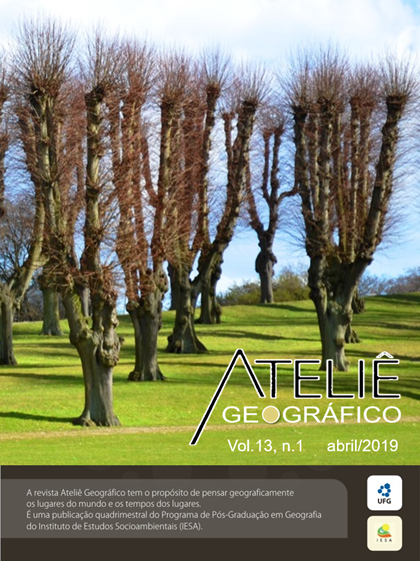Geographic connection micropolis of the state of Mato Grosso do Sul and their territorial links: a study of the frontier counties of Ponta Porã and Corumbá
DOI:
https://doi.org/10.5216/ag.v13i1.52275Abstract
The aim of this article is to make a study of urban geography regional in the state of Mato Grosso do Sul - Brazil, based on the geographic connection micropolis, represented by the cities of Corumbá, border with Bolivia; and Ponta Porã, border with Paraguay. These cities present a distinct condition of frontier cities, giving them an internal and external dynamic of flow of people, services and capital characteristic of their geographical positions. As a methodological procedure, the guidelines of Oliveira & Martins Jr. (2016) was adopted, which establishes a methodological basis for defining the regional, national and international articulations of counties, listed on three indicators according to their characteristics: 1) capacity of self-management; 2) capacity to sustain the territorial base and; 3) regional, national and international articulation capacity. These cities present a distinct condition of frontier cities, giving them an internal and external dynamic of flow of people, services and capital characteristic of their geographical positions.
Keywords: Regionalization; Frontier; Indicators.
Downloads
Downloads
Published
How to Cite
Issue
Section
License
Autores que publicam nesta revista concordam com os seguintes termos:- Autores mantém os direitos autorais e concedem à revista o direito de primeira publicação, com o trabalho simultaneamente licenciado sob a Licença Creative Commons Attribution que permite o compartilhamento do trabalho com reconhecimento da autoria e publicação inicial nesta revista.
- Os autores não serão remunerados pela publicação de trabalhos na Revista Ateliê Geográfico. Além disso, os conteúdos publicados são de inteira e exclusiva responsabilidade de seus autores, ainda que reservado aos editores o direito de proceder a ajustes textuais e de adequação às normas da publicação.
- Autores têm permissão e são estimulados a divulgar seu trabalho online (ex.: em repositórios institucionais ou na sua página pessoal), já que isso pode gerar alterações produtivas, bem como aumentar o impacto e a citação do trabalho publicado (Veja O Efeito do Acesso Livre).


